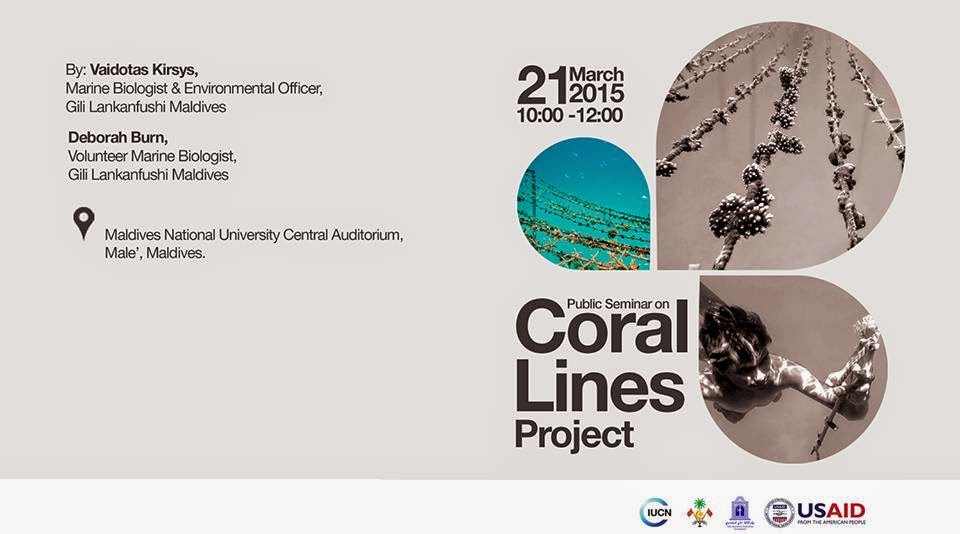On Saturday 21st of March, myself and Vaidas set off into Male to make a coral revolution! We had been invited by the IUCN (International Union for the Conservation of Nature) Maldives to present a seminar on our Coral Lines Project as part of Maldives National University marine science seminar series. Almost one year into the project, we were keen to share our findings with everyone, as well as promote data sharing throughout the Maldives.
We arrived early to set up our presentation and waited as the audience filed in. We had an excellent turn out with representatives from various resorts and companies including marine biologists, diving school staff, journalists, NGOs, and University students.
We were both a little nervous but as we began we found our stride and delivered what we hope was an interesting and inspiring talk. For those novices among us, we explained what a coral is and talked about different methods of reef restoration used around the world before delving into our project findings. We then moved on to talk about our two-step nursing approach, the inception of Coral Lines, the current status of our project and our plans for transplantation of the Coral Lines onto the reef. Having also shared some of the challenges we have faced, it was interesting to hear other biologists having similar issues in their projects and it was great to receive lots of ideas and solutions as well.
Vaidas took the opportunity to premier his Coral Lines video, filmed and edited by himself, which explains how the project was set up and how it is run- something which our audience really enjoyed!
One of the main issues surrounding reef rehabilitation in the Maldives that we wanted to address is the sharing of comprehensive data, so that we might learn from one another. Growth rates and survival rates of varying coral species, in varying conditions, using varying methods are almost impossible to find online, and in many cases are not even being recorded. We wanted to change that. With a lot of nodding and encouragement from our audience, we hope to lead the way with the Coral Lines streamlined data collection protocols and online sharing system, so that the future of reef rehabilitation in Maldives will focus further towards scientific data collection as well as the public sharing of that data! Only then can we make a positive contribution to reef rehabilitation science.
The full presentation was recorded and will be available for all to see on the IUCN website very soon, and the Coral Lines video is currently being narrated over, at which point we will make it public on YouTube and on our websites. We will inform readers when and where to find these materials once they’re available.
Finally, we wanted to say thank you. First to the resort, Gili Lankanfushi, and staff for supporting us throughout the project from inception through to the operation, to the IUCN and MNU for hosting us, and to our wonderful audience for taking the time to come and listen to us, as well as offering us a great wealth of knowledge and advice!
